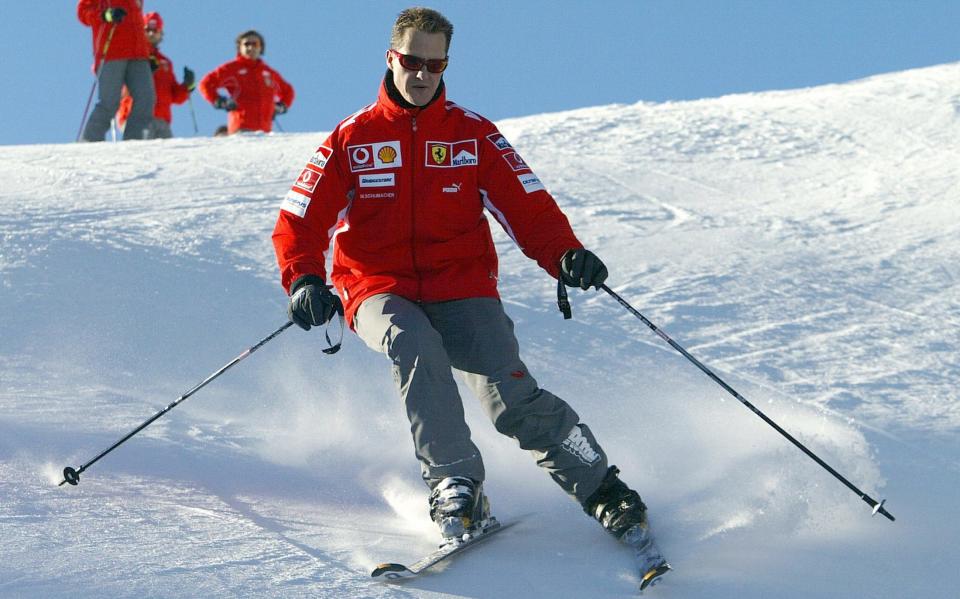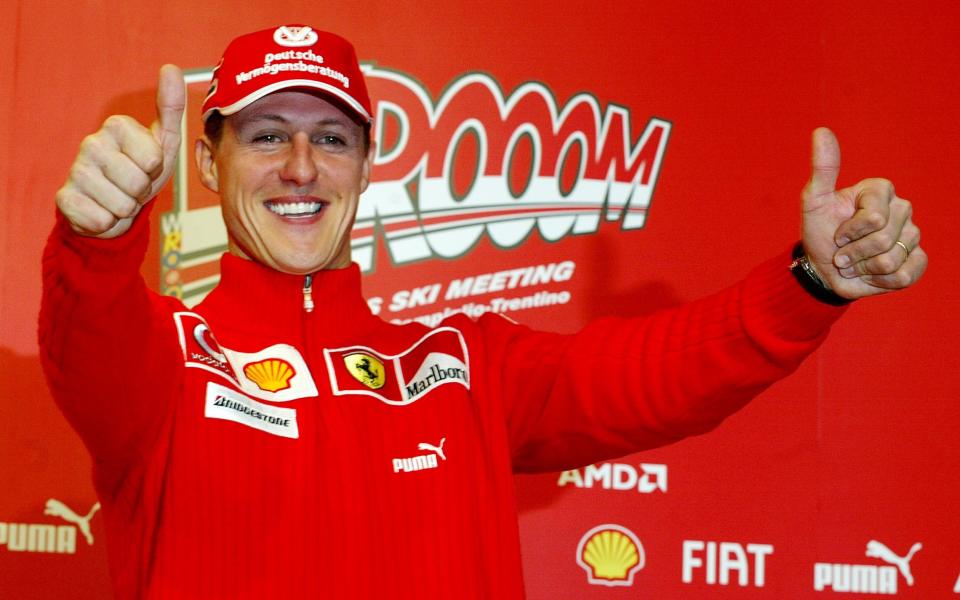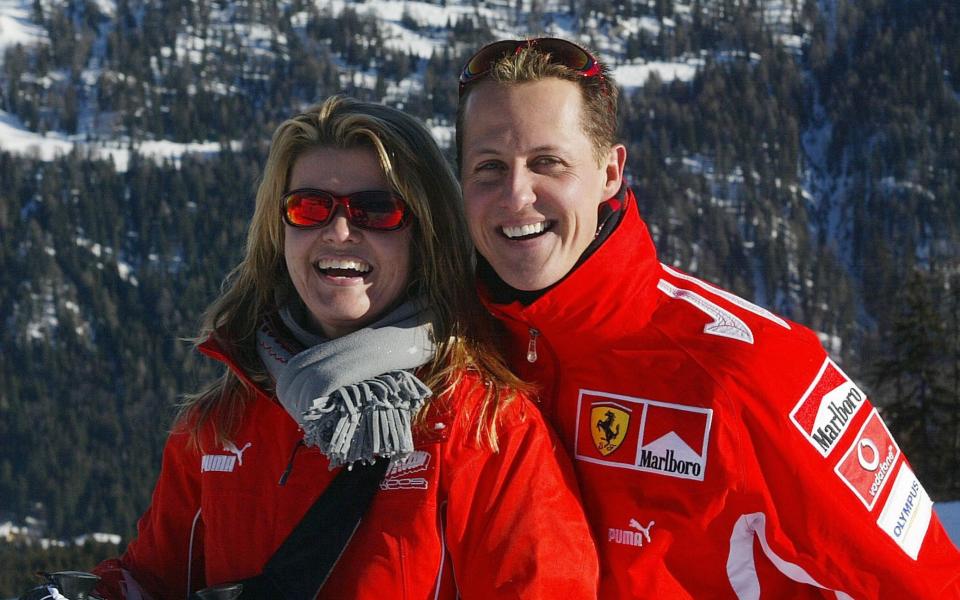Ten years after Michael Schumacher’s ski crash, silence only adds to ghoulish fascination

It is a landmark of almost impossible bleakness. December 29, 2023: the date signals 10 years since Michael Schumacher, Formula One’s once-insuperable idol, struck his head on a rock descending the Combe de Saulire above Meribel. He has not been seen in public since. All the waves of public sympathy have washed up against the wall of omerta demanded by his wife, Corinna. As such, the closing of this darkest of decades will go unacknowledged by his family, with their overwhelming silence negating the faintest hope for his recovery from brain injury.
The secrecy has served only to heighten the ghoulish fascination with his condition. Earlier this year, Die Aktuelle, a women’s weekly magazine in Germany, screamed on its cover: “Schumacher – the first interview!” It seemed, given Corinna’s scrupulous refusal since 2013 to shed any light on Michael’s health, an unlikely claim. Sure enough, the alleged interview turned out to have been generated by Artificial Intelligence. The family threatened legal action, and the editor was sacked.
But still the appetite for an update is insatiable. This week, a headline in Bild declares: “New Schumi documentary leaves fans guessing.” Attaching a blurry still of Schumacher beside a microphone, the story asks breathlessly: “When was the scene filmed? Is there reason for his supporters to hope?” Not on this evidence. Andreas Troll, director of the five-part ARD series released on Thursday night, reveals that the footage was shot in 2012, a year before the fateful skiing accident.
This preying on people’s morbid curiosity can be distasteful. But it raises an intriguing question: how do Schumacher’s disciples, counted in the millions at his peak, mourn someone who is still alive but who, in all probability, they will never see again? Willi Weber, his manager during all seven of his world title triumphs, has wrestled with this very dilemma. Once the driver’s ever-present sidekick, he discovered that the family’s insistence on privacy over medical details left him frozen out.

“I called the next day, and no one answered,” Weber explained last year. “I didn’t expect behaviour like that and I’m still angry about it. They kept me out, telling me: ‘It’s too early.’ Well, now it’s too late. Maybe they should just say it the way it is.”
Of late, though, he has mellowed, suggesting that the stages of his grief over Schumacher have passed from anger to acceptance. “When I think of Michael now, unfortunately I don’t have hope,” he said this month. “I mourned like a dog after his accident. It hit me incredibly hard, you can imagine. But the point came when I had to free myself from Michael and let go.”
There is a shattering pathos to Schumacher’s fate. How could a man who derived his oxygen from danger have found his life ruined by an innocuous fall on a family ski trip? Yes, he went off-piste that morning in the French Alps, but he had taken far greater risks behind the wheel of his Ferrari at 200mph. He should, at 54, be luxuriating in the trappings of true greatness. Instead, he lies hidden behind the gates of his vast house beside Lake Geneva, receiving round-the-clock care. If people are desperate for answers, it is because most cannot fathom such a pitilessly cruel ending to an iconic career.
What can be said without conjecture about Schumacher’s present state? One fair deduction is that he is non-verbal. The corroboration is a comment from his son Mick, a reserve driver for Mercedes, who reflected during a Netflix documentary in 2021: “I think my father and I would understand each other differently now, that we would speak a similar language, the language of motor racing, and we would have a lot to talk about. I think about how great it would be, what it would have been like. I’d give anything to have that.”
Otherwise, the rule of the Schumacher story seems to be that no news is bad news. Amid the frenzied demands for information in those initial days, Gary Hartstein, a former F1 doctor, sought to be a voice for optimism, documenting all the signs the driver would have to show, and when, to avoid the worst effects of neurological injury. But when Schumacher’s time in a coma passed three months, he told fans to expect the worst.
Over the decade since, there has been little need to revise that warning. Stefano Domenicali, the F1 chief executive, says: “Living like this for 10 years is something you would never wish on even your worst enemy.”

“Keep fighting Michael” is still a message you hear within F1. Nobody understood the notion better than Schumacher himself, who said in 2007: “I’ve always believed that you should never, ever give up. You should always keep fighting, even when there’s only the slightest chance.”
But the world he confronts today is not of a type to be conquered through tenacity or courage. He has simply been the victim of a desperate misfortune, which he could never have foreseen on that innocent morning in the mountains. That he must continue to live in the horrors of its shadow is a reality with which his family, indeed anyone who cares for him, struggles to adjust.
Ralf Schumacher laments how he has lost more than a brother. “When we were kids, he was also my coach and mentor,” he said. “He taught me literally everything about kart racing. There may be an age gap of seven years, but he was always by my side. He passed on all the different things he had internalised. He was very lucky throughout his life, but then there was this tragic accident. That day held a lot of bad luck. This fate has changed our family.”
While Mick prepares to embark on a fresh chapter in endurance racing, his sister has proved an accomplished equestrienne. As for Corinna, the word from Johnny Herbert, Schumacher’s former team-mate, is that “she is getting on with things as Michael would have wanted”. In circumstances as heartbreaking as these, pragmatism appears the only possible response to the pain.

